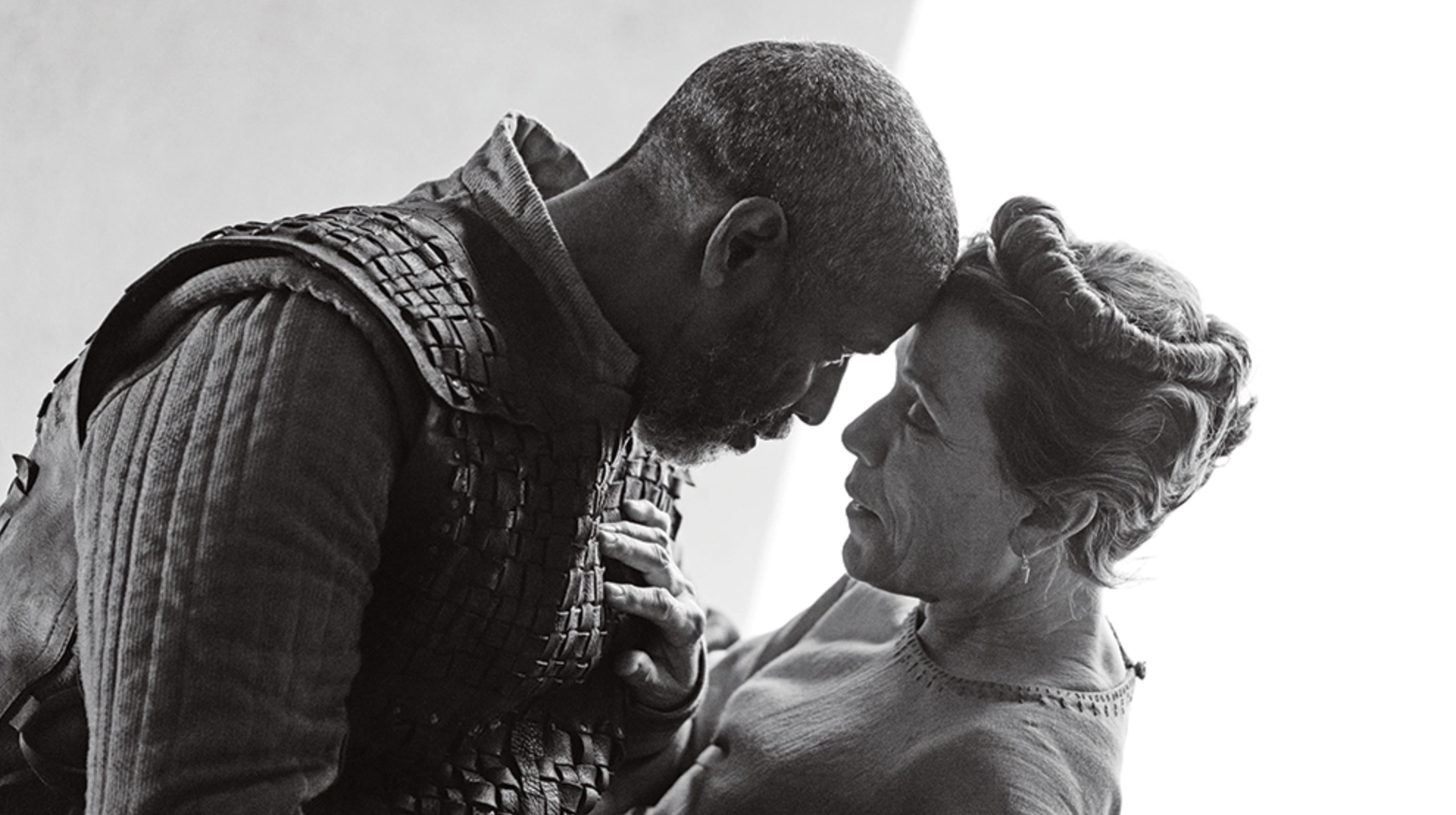Even before its foggy, thumping first teaser trailer dropped, anticipation for Joel Coen’s Macbeth adaptation was at a cauldron-esque boil. The director’s first “serious” film in nearly a decade was to feature two of the most universally beloved (and frequently awarded) working actors, chomping their acclaimed maws down on two of the most storied characters in literary history; it would mark Coen’s first collaboration with A24, a film studio that’s become near-synonymous with the phrase “should have been Best Picture”; it would be in black and white. What could possibly go wrong?
Not the visuals. To the movie’s credit, The Tragedy of Macbeth is a cinematically arresting 105-minute tip-of-the-cap to the likes of Akira Kurosawa, Orson Welles, and Ingmar Bergman, featuring a who’s who of generationally-talented stage-and-screen actors. The script isn’t half bad either (co-writer Bill Shakespeare is a name to watch—you heard it here first).
Unfortunately, for all its riveting cinematography, the film’s on-front-street reverence is more often than not a reminder of more effective, more deeply realized adaptations (Throne of Blood’s keep full of real-life ravens > Tragedy’s murder of CGI crows, among other comparisons). Coen reasonably assumes a level of familiarity with the Scottish play, and his decision to spend less time fixated with the plot-propelling political machinations is an understandable consequence; but what could have served as an opportunity to spend more time delving into the psychological trauma of prophecy, guilt, and ambition (something essential to the best of the Coen Bros’ filmography) is instead devoted to gratuitous camera flexes.
In and of itself, that’s no critique. At their Bergman-esque best, they are among Coen’s most captivating. The symmetrical reflection of the weird sisters in an eerie Scottish bog and the leaves of Birnam Wood pouring through the window of the keep are shots that will stay with you. DP Bruno Delbonnel (previously a collaborator on Inside Llewyn Davis and The Ballad of Buster Scruggs) expertly refracts the stagey self-seriousness of Welles’ Macbeth through the heightened weirdness of an M.C. Escher print.
(GIF via Tenor.com)
Unfortunately, the substance beyond the visuals can’t navigate that marriage so seamlessly. For the most part, the cast fails to deliver the eccentricity necessitated by such visual camp (despite Kathryn Hunter’s ever-contorting trio of witches, and Alex “Greatest Eyebrow Raiser in Cinematic History” Hassell’s Ross doing their best to put the team on their backs), leaving it feeling superfluous and detached from the psychological turmoil of its characters; a recitation of madness rather than a true immersion into it.
Which brings us to the Washington-and-McDormand of it all: Even a mediocre Macbeth production can be elevated to, if not greatness, then close, by the performances at its center (Patrick Stewart’s 1960s-styled interpretation, for example). Baked into the anticipation of Coen’s film was the implicit confidence that, all-else-failing, we were sure to get a killer (pun only semi-intended) Lord and Lady M. Yet in spite of the indisputable brilliance of both performers, their portrayals here fell short of the expectations their respective filmographies set.
Washington (who earlier this year delivered his first true slog in ages with The Little Things) seems throughout Tragedy to be approaching his role with a remove that feels misaligned with both the ambition and the gravitas of his character. At film’s open, there’s very little leading us to believe him a throne-seeker, and less to convince us he’d kill his cousin to do so.
That this inner conflict does not wrack him until after the crime seems unbelievable, but even more jarring is his apparent apathy from the point of prophecy through the murder-most-foul—almost as if Washington, the actor, is simply wading through the early scenes so he can get to the meat of his performance.
When he does, he is unsurprisingly show-stealing, bellowing iambic pentameter with all the demented swagger of “King Kong ain’t got shit on me” and dispatching would-be assassins with the self-assuredness of a man possessed. However absent that essential time spent establishing the emotional motivations of Macbeth, Thane of Glamis, it’s difficult to believe the madness of Macbeth, King hereafter, as anything more than well-delivered artifice.
Contrast that with the Macbeth analog in Akira Kurosawa’s Throne of Blood, Washizu Taketoki (portrayed by the ever-transcendent Toshiro Mifune): From the first appearance, Washizu is a bundle of chaotic ambition and bravado straining against the confines of his political station. The moment the (in this case singular) witch raises the possibility of rulership, his face contorts, playing out the conflict between his desire for power and his knowledge that he has no just claim to it. Through each conversation with Isuzu Yamada’s haunting Asaji (the film’s Lady Macbeth stand-in), he is visibly tormented by the morality standing in the way of his desires. When he finally snaps, the physical release is palpable.
(Image via The Hollywood Reporter)
This is not to say bombast is a requisite for an effective Macbeth. The choice to deliver a quieter, more internally anguished portrayal could have been a fascinating foundation for the titular tragedy; but here, Washington overplays his signature cool to the detriment of that emotional arc, his steely resolve leaving little room for such compelling tension.
McDormand’s case is more complex. On the one hand, it’s wonderful to see a rendering of Lady Macbeth that does not consign her to the thinly-veiled misogyny of a wicked-siren archetype. On the other, the decision to more fully center Washington as the architect of his own downfall shifts McDormand to the emotional periphery for much of the film and deprives her character of much of her previous agency (even to the point of implying, in a dramatic departure from the original text, that her death comes at the hands of Ross instead of her own).
In spite of a delightfully unhinged performance of the “out, damned spot” monologue, the result is a character arc that reads less like an inevitable, guilt-induced descent into insanity, and more like a disjointed Wikipedia summary of that same narrative.
Even in the absence of more fully-realized individual arcs, this presentation of the Macbeth family dynamic as partnership-rather-than-puppetry could have opened the door to a fascinating examination of toxically political relationships—but this, too, seems a tertiary concern of Coen-and-co. The film seemed more concerned with how they look together than how they live together and does little to investigate the intertwining tendrils of love and dependence and shame between the leads, offering only fleeting hints of chemistry (beyond that of two brilliant actors chewing the same scenery).
(Image via Faz.net)
Perhaps the process of adaptation, especially of such a storied source, begets an unfair amount of comparison–it certainly makes it difficult to consider the film purely on it’s own terms—but the real tragedy of The Tragedy of Macbeth is how perfectly suited Coen seemed as an interpreter of the original text. Few directors can deliver such deft masterclasses in tension as No Country For Old Men or Blood Simple, or so perfectly balance the gut-combusting comedy of Fargo against its mortal stakes.
Instead, we got a film that feels trapped between the poles of its potential, never fully committing to the profound darkness or the supernatural lunacy; a visual feast that leaves you as empty by its end as at the start; a tale, full of sound and fury, signifying nothing.
3.5 out of 5 Alex Hassel Cocked Eyebrows
The Tragedy of Macbeth is in theaters and available to stream now on Apple TV+
For Nate’s complete Coen Brothers’ and 2021 End Of Year Rankings, swing by his Letterboxd












